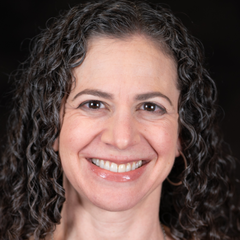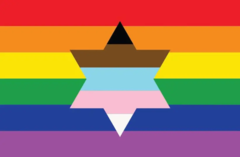Pts: A place to belong
07/01/2022 09:50:55 AM

President
When I was a young mother, I wanted the synagogue to be a second home for my family. I wanted it to feel familiar and comfortable. I wanted my children to know where everything was and to feel free (within reason) to relax, run around, and be themselves. In other words, I wanted the synagogue to be a place where they felt they truly belonged. As president of our congregation, I want every one of our members to have that same feeling about PTS.
We reflexively use the language of “belonging” when we talk about synagogue affiliation. We say we “belong” to a synagogue if we pay membership commitment or dues there. It’s similar to the way we talk about “belonging” to a gym or a country club.
But, membership in a gym or a country club is transactional: you pay your dues, and in return, you get the right to use the facilities and access the programming. Synagogue membership should be different. When you join a synagogue, you are not engaging in a quid pro quo transaction. You are joining a community, a family. You should not merely belong to a synagogue; the synagogue should be a place where you feel a true sense of belonging.
What does it mean to have a true sense of belonging? It means feeling that you are part of the community, not an outsider or even a welcomed guest. It means being accepted without having to hide or apologize for any part of who you are. It means being able to relax, lower your defenses, and be yourself. It means feeling valued, connected, and understood.
My family doesn’t have to work hard to feel at home in Jewish spaces; we just have to show up. As White, Ashkenazi Jews with the last name “Rosenberg,” our Jewish identity is never questioned. As a straight, married Jewish couple raising straight, cisgender kids, we are never made to feel that synagogue rituals and programming aren’t geared toward us. As able-bodied people, we never worry about our ability to fully participate in synagogue life.
But our experience is far from universal. It is becoming increasingly clear that traditional assumptions about what Jewish people and families look like are woefully incomplete. The Union for Reform Judaism reports that, since 2000, 71% of non-Orthodox Jewish marriages in the United States are interfaith. At least 10% of American Jews are of Mizrachi or Sephardic heritage. In addition, at least 12-15% of American Jews identify as People of Color and even more have People of Color in their households. At least 10% of North American Jews openly identify as LGBTQ+; for those between the ages of 18-29, that number may be as high as 20%. Twenty percent of the American Jewish community lives with a disability. Our community also includes unmarried people, families without children, and people with diverse education levels and socioeconomic status.
Sadly, members of the Jewish community who don’t fit the traditional model often struggle to feel the sense of belonging in Jewish spaces that comes so easily to me and my family. Jews of Color report that they are regularly subjected to comments and questions, frequently well-intentioned, that assume they don’t belong and make them feel “othered” and alienated. People with diverse family structures feel excluded from programming that seems designed for households consisting of a Jewish mom, a Jewish dad, and Jewish kids. People with limited vision, hearing, or mobility face barriers to full participation. And so on.
So how can we enhance the sense of belonging for every PTS member? At the congregational level, PTS has created a Diversity, Equity, Inclusion, and Belonging (DEIB) Working Group to assess our current practices and recommend ways we can improve. We are taking a hard look at the language we use, the programming we offer, the accommodations we provide, and more. On an individual level, I ask each of our congregants to examine their own assumptions about what “Jewish” looks like and to be open to a broader perspective. The goal is for everyone who walks through our doors with the sincere desire to connect with a Jewish faith community to feel they have come to the right place.
In recent years, many organizations have committed themselves to “diversity, equity, and inclusion.” To some people, these efforts are just a fad. To others, they have become politicized. But creating a sense of belonging for the full spectrum of the Jewish experience is not about following trends or being politically correct. It is about ensuring that PTS fulfills the promise of our Vision statement: “PTS is an inclusive Jewish community where everyone can find peace, inspiration, and their own connection to Judaism.”






